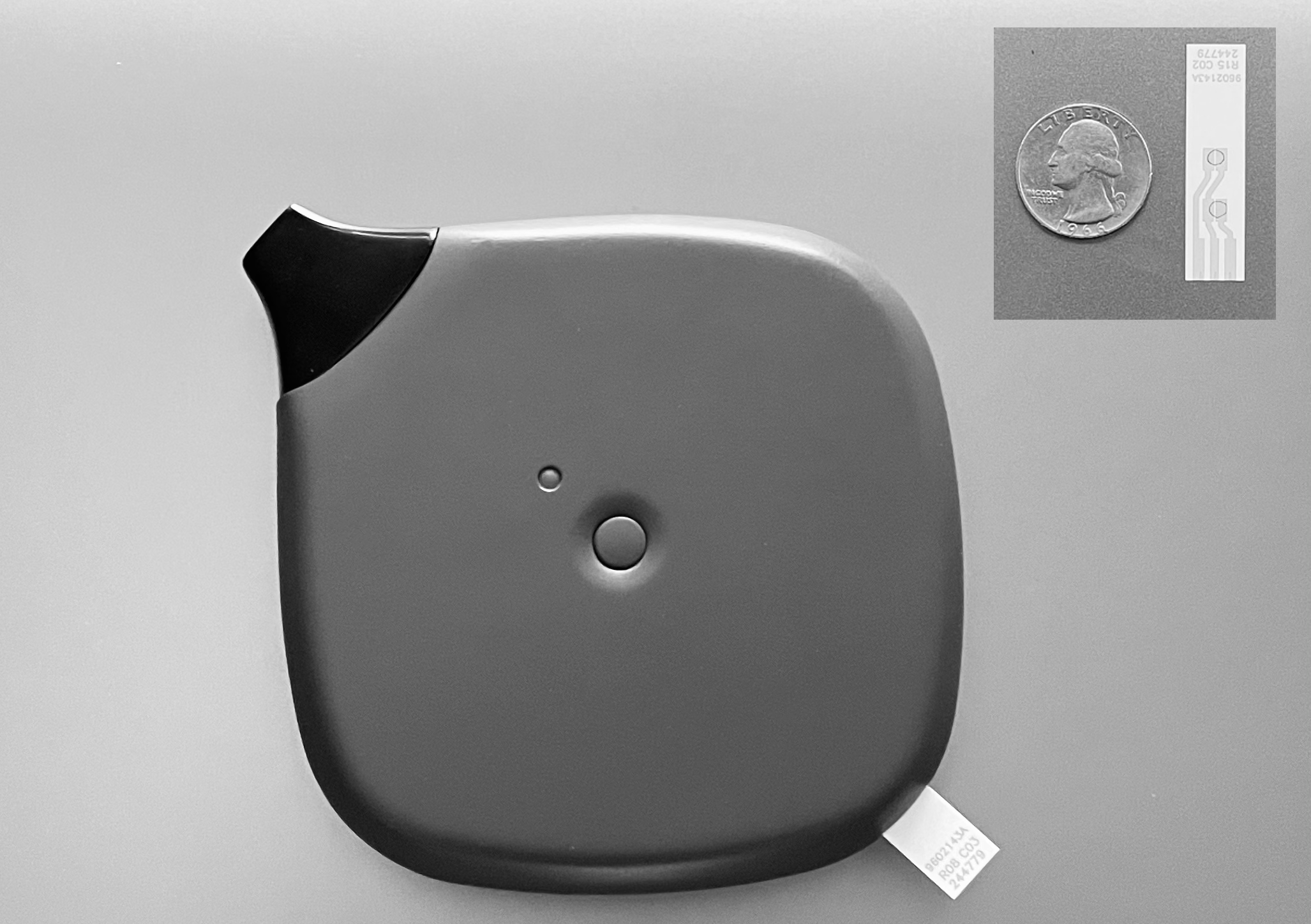
The novel technology at the heart of myBiometry’s asthma solution is a patented sensor (top right) and device (center) that measures nitric oxide, a biomarker of airway inflammation, in breath. This is used to determine if an individual is at risk for an asthma attack.
Nationwide, more than 25 million people have asthma, including about 20 million adults and 5.1 million children and adolescents. If not well-controlled, the chronic condition can cause airways to swell and narrow, making it hard to breathe. This is called an asthma attack, and in a single year, more than 10 million people have one, according to the Centers for Disease Control and Prevention, resulting in 1.6 million emergency room visits and over 3,500 deaths.
Now a Boston-based startup, myBiometry, is aiming to improve asthma management by helping people take action—even in the absence of symptoms—weeks before a potential attack could occur.
“Our mission, just very simply stated, is to end asthma attacks,” said CEO Bryan Nolan, who founded the company in 2013.
At the MedCity INVEST Conference in Chicago, the company was selected as the winner in the Pitch Perfect contest’s Diagnostics 2.0 track by judges, who are all active investors.
Asthma and COPD is a huge market with a lot of unmet need, said Michelle Snyder, a partner at McKesson Ventures, and one of the three judges. Snyder said the company’s solution, if successful, could have a big impact not only on a patient’s quality of life but also in reducing the cost of asthma treatment to the healthcare system. In particular, myBiometry’s tech-plus approach impressed the judges.
“I think in many cases, technology may not be enough,” Snyder said, and it helps to have the option to talk to a live person if a patient needs extra nudging.

Health Benefit Consultants, Share Your Expert Insights in Our Survey
Share some of the trends you are seeing among your clients across healthcare, including chronic conditions, behavioral health, healthcare navigation, and more.
myBiometry’s multipronged asthma solution, called Mya, combines home-based diagnostics, digital health and a care team to identify patients at risk and proactively intervene to prevent asthma attacks, Nolan said. The novel technology at the heart of its solution is a patented sensor and device that a person with asthma can use to detect fractional exhaled nitric oxide (FeNO) in breath. This is a biomarker of airway inflammation that the company uses to help determine, among other things, if a person is at risk for having an asthma attack, said Nolan, who is the co-inventor of myBiometry’s technology.
With myBiometry’s approach, you’re able track changes over time, and even before a person might be able to feel those changes, Nolan said. The inflammation in a person’s airway starts to change about 20 days before asthma symptoms or attacks—and that change can be detected by measuring the biomarker nitric oxide.
“So you can pick up issues well in advance and deliver interventions to suppress the inflammation and reduce the risk,” Nolan said.
Those adjustments can range from making lifestyle changes, like being active to getting more rest, to ensuring you’re taking medications appropriately.
The device also gathers indoor environmental data of known asthma triggers. It connects to an app that guides the patient through the test process, which involves a slow, steady exhale into the black tip of the device. The result and its interpretation are displayed immediately after a patient performs the test once daily.
“We combine this data with symptom scores, asthma control, and exposure to indoor and outdoor environmental triggers which is tracked via the app. We use the data to identify patients at risk of an attack before they become symptomatic and biologically monitor adherence and efficacy of medications,” Nolan explained. “Behind the scenes, our algorithms turn the data into personalized and actionable insights. Interventions are delivered proactively via the app or care team of certified asthma educators, nurses and physicians.”
The company’s primary competitors are office and lab-based diagnostics that measure the same biomarker. It will compete against diagnostics companies like Circassia and Cohero Health and companies that use sensors attached to inhalers to monitor adherence to asthma treatment such as Adherium and Propeller Health, according to Nolan.
“Our primary advantage is our ability to perform tests at home cost-effectively each day,” he said. “That gives us a proprietary dataset and enables us to use the trends to biologically determine adherence, the efficacy of medication, correct inhaler technique, and the risk of attack.”
Data shows many people with asthma don’t use their inhalers correctly, and suffer worse outcomes as a result.
Michelle Snyder at McKesson Ventures said going forward she’ll be interested to see how patients are engaging the product, and the outcomes data from using it, in terms of its impact on asthma management.
“Oftentimes it’s hard to get people to change their behavior when they don’t feel like anything’s wrong,” Snyder said.
But she thinks that the company’s tech-plus approach could help with that.
myBiometry hasn’t commercialized its product yet, and the company didn’t provide cost or revenue projections. But it plans to sell its solution to employers. The initial target will be large, self-funded employers that already pay a subscription fee for chronic disease management programs to address conditions like diabetes and hypertension. The startup will bill monthly via invoice or claims, and the patient will need a prescription for the diagnostic but not the software.
To date, the company has raised $3.3 million. It has a goal to raise another $8 million in 2022 and $10 million to $15 million in 2023, Nolan said. That will be used to fund customer pilots, submit the diagnostic for 510(k) approval, obtain regulatory clearance and begin early commercialization, he said.
“Longer term our vision is really to be the leader in asthma monitoring and management,” Nolan said. “What Livongo’s been able to do in diabetes—we want to do that in asthma.”
Photo: myBiometry














